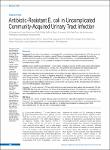Antibiotic-Resistant E. coli in Uncomplicated Community-Acquired Urinary Tract Infection
A Prospective Cohort Study from 2015/16 (the SARHA Study) Compared With Data From the Antimicrobial Resistance Surveillance System (ARS)
Klingeberg, Anja
Noll, Ines
Willrich, Niklas
Feig, Marcel
Emrich, Dagmar
Zill, Edith
Krenz-Weinreich, A.
Kalka-Moll, Wiltrud
Oberdorfer, Klaus
Schmiemann, Guido
Eckmanns, Tim
Background: Routine urine culture testing is not recommended for uncomplicated urinary tract infections (UTIs). As a result, the antibiotic resistance patterns or the organisms causing UTIs are not adequately reflected in routine data. We studied the sensitivity of Escherichia coli (E. coli) to trimethoprim (TMP) and to cotrimoxazole (i.e., trimethoprim/sulfamethoxazole, TMP/SMX) in community-acquired UTI and compared the findings with the resistance data of the Antimicrobial Resistance Surveillance System (ARS).
Methods: General practitioners and internists in private practice prospectively recruited all of their adult patients with symptoms of a urinary tract infection from May 2015 to February 2016. Urine specimens from all patients were tested (including urine culture testing and antibiotic susceptibility) and infections were defined as uncomplicated or complicated UTIs.
Results: 1245 participants from 58 medical practices were enrolled in the study. Pathogenic organisms were found in the urine of 877 patients, of whom 74.5% had E. coli infections. Among the E.-coli-positive UTIs, 52.4% were classified as uncomplicated and 47.6% as complicated. The prevalence of E. coli that was resistant to TMP and to TMP/SMX in uncomplicated UTIs was 15.2% and 13.0%, respectively, compared to 25.3% and 24.4%, respectively, from all UTIs in ARS in 2015. Study participants who had previously taken antibiotics had the highest prevalence of E. coli resistance (30.9%), followed by those who had two or more UTIs within the past six months (28.9%).
Conclusion: E. coli with resistance to TMP was significantly less prevalent among the study patients with uncomplicated UTIs than in the routine data of the ARS. Accordingly, TMP should still be considered as an option for the treatment of uncomplicated UTIs. TMP/SMX is considered the agent of second choice because of its side effects. Surveillance systems based on routine data do not yield a representative sample for the evaluation of the resistance situation in patients with uncomplicated UTIs.
Files in this item
No license information

